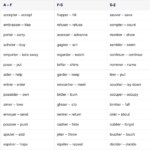The Verb “Venir” in the Present Tense
In this lesson, we will focus on the verb “venir,” which means “to come” in English. This is an irregular verb, which means it does not follow the regular conjugation patterns that most verbs in French do.
Objective:
- To understand and learn the conjugation of the verb “venir” in the present tense.
- To use “venir” correctly in sentences.
Conjugation of “Venir”: Here is how “venir” is conjugated in the present tense:
| VENIR | Traduction |
|---|---|
| Je viens | I come |
| Tu viens | You come |
| Il/Elle/On vient | He/She/It comes |
| Nous venons | We come |
| Vous venez | You come |
| Ils/Elles viennent | They come |
Notice how “venir” does not follow a regular pattern, especially with “nous” and “vous” forms.
Usage: “Venir” can be used in various contexts such as arriving at a place, coming from a place, or in expressions like “venir de + infinitive” which is used to express a recent past (just did something).
Examples:
- Je viens de Paris. I come from Paris.
- Nous venons au cinéma. We are coming to the cinema.
- Ils viennent de manger. They have just eaten.
🍀 Exercises 🍀
Exercice 1 : Conjugate “venir” with the following subjects:
Exercice 2 : Complete the sentences with the correct form of “venir”:
Practice Sentences for Translation:
- I am coming with my sister.
- Are you coming to the party?
- He comes from a small town.
- We are coming back tomorrow.
- They come to see us every year.
Conclusion: Now that you have learned how to conjugate and use “venir” in the present tense, try to incorporate it into your everyday French conversations. Remember, practice makes perfect!

